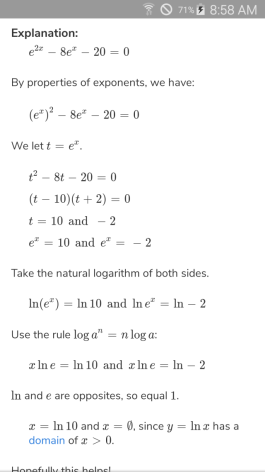Solve for x,2e^2x-8e^x+6=0?
2020-07-03 3:52 pm
回答 (8)
2020-07-03 5:02 pm
2e²ˣ - 8eˣ + 6 = 0
e²ˣ - 4eˣ + 3 = 0
(eˣ)² - 4(eˣ) + 3 = 0
(eˣ - 1)(eˣ - 3) = 0
eˣ = 1 or eˣ = 3
x = ln(1) or x = ln(3)
x = 0 or x = ln(3)
e²ˣ - 4eˣ + 3 = 0
(eˣ)² - 4(eˣ) + 3 = 0
(eˣ - 1)(eˣ - 3) = 0
eˣ = 1 or eˣ = 3
x = ln(1) or x = ln(3)
x = 0 or x = ln(3)
2020-07-08 3:05 pm
2e^(2x) - 8e^(x) + 6 = 0 → you can simplify by 2
e^(2x) - 4e^(x) + 3 = 0
e^(x + x) - 4e^(x) + 3 = 0 → you know that: x^(a + b) = (x^a) * (x^b)
[e^(x) * e^(x)] - 4e^(x) + 3 = 0 → let: X = e^(x) where: X > 0
[X * X] - 4X + 3 = 0
X² - 4X + 3 = 0
X² - 4X + 4 - 1 = 0
X² - 4X + 4 = 1
(X - 2)² = 1
X - 2 = ± 1
X = 2 ± 1
First case: X = 3
e^(x) = 3
x = Ln(3)
Second case: X = 1
e^(x) = 1
x = Ln(1)
x = 0
→ Solution = { 0 ; Ln(3) }
e^(2x) - 4e^(x) + 3 = 0
e^(x + x) - 4e^(x) + 3 = 0 → you know that: x^(a + b) = (x^a) * (x^b)
[e^(x) * e^(x)] - 4e^(x) + 3 = 0 → let: X = e^(x) where: X > 0
[X * X] - 4X + 3 = 0
X² - 4X + 3 = 0
X² - 4X + 4 - 1 = 0
X² - 4X + 4 = 1
(X - 2)² = 1
X - 2 = ± 1
X = 2 ± 1
First case: X = 3
e^(x) = 3
x = Ln(3)
Second case: X = 1
e^(x) = 1
x = Ln(1)
x = 0
→ Solution = { 0 ; Ln(3) }
2020-07-03 11:48 pm
2e^2x -8e^x +6 = 0;
Put u = e^x. Then 2u^2-8u+6 = 0, ie., u^2-4u+3 = 0, ie., (u-1)(u-3) = 0, ie.,;
e^x = 1...(i) or e^x = 3...(ii).;
For (i) holding, x = ln(1) = 0.;
For (ii) holding, x = ln(3).
Put u = e^x. Then 2u^2-8u+6 = 0, ie., u^2-4u+3 = 0, ie., (u-1)(u-3) = 0, ie.,;
e^x = 1...(i) or e^x = 3...(ii).;
For (i) holding, x = ln(1) = 0.;
For (ii) holding, x = ln(3).
2020-07-03 11:24 pm
2e^(2x)-8e^x+6=0
=>
e^(2x)-4e^x+3=0
=>
(e^x-3)(e^x-1)=0
e^x=3=>x=ln(3).
e^x=1=>x=ln(1)=0.
Either x=ln(3) or x=0 is the solutions.
=>
e^(2x)-4e^x+3=0
=>
(e^x-3)(e^x-1)=0
e^x=3=>x=ln(3).
e^x=1=>x=ln(1)=0.
Either x=ln(3) or x=0 is the solutions.
2020-07-03 6:45 pm
Assuming 2e^2x should be 2e^(2x),
2e^(2x) - 8e^x + 6 = 0
e^(2x) - 4e^x + 3 = 0
(e^x - 3)(e^x - 1) = 0
e^x = 3 or e^x = 1
x = ln3 or x = 0
2e^(2x) - 8e^x + 6 = 0
e^(2x) - 4e^x + 3 = 0
(e^x - 3)(e^x - 1) = 0
e^x = 3 or e^x = 1
x = ln3 or x = 0
2020-07-03 6:05 pm
2e^2x-8e^x+6=0
[2e^(x) - 6][e^(x) - 1] = 0
2e^(x) - 6 = 0, e^(x) - 1 = 0
e^(x) = 3 , e^(x) = 1
x = ln(3), x = ln(1)
x = ln(3) or 0....
[2e^(x) - 6][e^(x) - 1] = 0
2e^(x) - 6 = 0, e^(x) - 1 = 0
e^(x) = 3 , e^(x) = 1
x = ln(3), x = ln(1)
x = ln(3) or 0....
2020-07-03 4:01 pm
Here you will understand better.

2020-07-03 4:01 pm
e^x = k
2k^2 - 8k + 6 = 0
k^2 - 4k + 3 = 0
(k - 3) * (k - 1) = 0
k = 1 , 3
e^x = 1 , 3
x = ln(1) , ln(3)
x = 0 , ln(3)
2k^2 - 8k + 6 = 0
k^2 - 4k + 3 = 0
(k - 3) * (k - 1) = 0
k = 1 , 3
e^x = 1 , 3
x = ln(1) , ln(3)
x = 0 , ln(3)
收錄日期: 2021-04-18 18:31:49
原文連結 [永久失效]:
https://hk.answers.yahoo.com/question/index?qid=20200703075220AAfP3Gl




